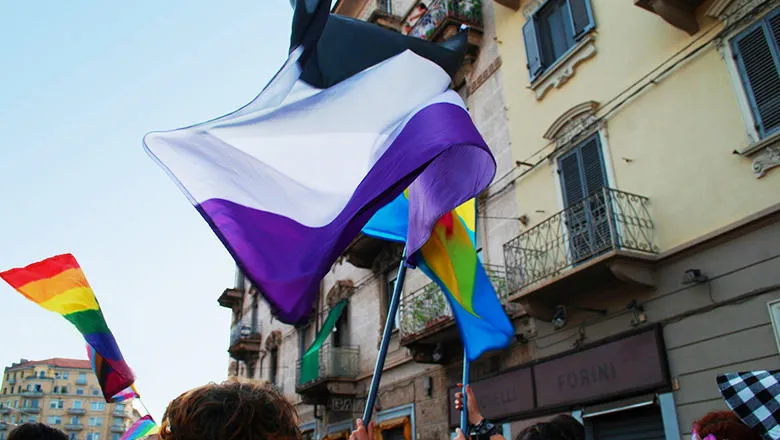07 February 2025
Asexual people face ignorance and intolerance in UK, study suggests
One in four participants wrongly believe asexuality is a mental health problem

Read the research
New research suggests people who are asexual face considerable ignorance and potentially intolerance, with as many as one in three (31%) respondents in an experimental study of 400 people believing asexuality can be “cured” by therapy.
The research, carried out by the Policy Institute at King’s College London in collaboration with the aromantic-asexual activist and model Yasmin Benoit, also finds around one in four (23%) participants wrongly believe asexuality is a mental health problem.
The study, based on a survey of 400 people in England, suggests notable minorities hold other misconceptions about asexuality:
- Two in five (42%) respondents believe people cannot be asexual if they have sex. The authors emphasise that in reality asexuality refers to how someone feels about sex, and whether they experience sexual attraction – not their behaviour.
- A quarter (26%) believe asexual people just haven’t met the right person yet.
- One in nine (11%) go as far as saying they don’t believe asexual people exist.
The sample is not classed as nationally representative. Respondents came from the online platform Prolific and, compared to the UK population as a whole, were slightly younger, more likely to identify as LGBTQIA+, and more likely to have a higher education qualification.
Participants signed up to take part in the survey on the platform Prolific, which is regularly used for behavioural science research, with the sample size of 400 is large by the standards of these types of studies.
Given that inclusive attitudes in general, and towards LGBTQIA+ people, are more common among these groups, the authors argue the findings likely overstate the public’s understanding of asexual people and underestimate the intolerance they face.
However, the researchers say comfort can be taken from the fact these are minority beliefs, and that despite their existence, seven in 10 (71%) people included in the study say asexual people should be protected by legislation, while a similarly large majority (73%) say they’d be comfortable if their child was asexual.
Are people afraid of voicing their true feelings about asexual people?
As well as being among the first to consider public attitudes to asexual people, the study is also the first to make use of a “double-list experiment” methodology, which is designed to detect whether the answers that study participants give are motivated by “social desirability bias” – in other words, whether they harbour negative sentiments but are reluctant to voice them for fear of disapproval from others.
The study found there is no sign of social desirability bias when it comes to attitudes towards asexuality. Although this has some positive elements, the researchers say, it means people do not view anti-asexual beliefs as socially unacceptable, and are likely to express a view if they hold it, suggesting asexual people may experience hostility with greater frequency than other groups in society.
Yasmin Benoit, aromantic-asexual activist and Visiting Research Fellow at King’s College London’s Policy Institute, said:
“Acephobia – that is, discrimination, prejudice and negative attitudes towards those who identify as asexual – is not something that most people recognise or take seriously. It's something the asexual community are not protected from. My experiences with this kind of intolerance are well-documented, but there's a huge lack of research into the phenomenon. It's essential to raise awareness and collect data to create the change the asexual community needs. It's an honour to be able to work with King's College London on this research as a Visiting Fellow and be part of that progress.”
Michael Sanders, Professor of Public Policy at the Policy Institute, said:
“Our previous work on the wellbeing of university students revealed those who identify as asexual have the worst wellbeing of any group in the LGBQA grouping, yet there is little quantitative data relating to their experiences or to wider public perceptions of asexual people. We wanted to address this gap, and our study is the first that we’re aware of that makes use of these methods to assess people’s attitudes towards asexuality. The findings are troubling, both in that many people hold misconceptions about asexuality, and that they are happy voicing discriminatory views – at a greater rate than for other groups.”
About the study sample
For this study, a survey was conducted of 400 adults in the UK, in order to understand their attitudes towards asexuality and asexual people. This sample is drawn from the online platform Prolific, and is not representative – instead skewing towards groups who typically hold more progressive values, including LGBTQIA+ people and those with a higher education qualification.
